Magnitude 5.5 Earthquake Strikes Southern Iran
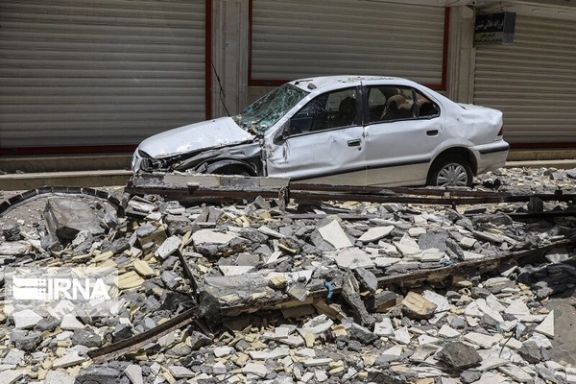
A magnitude 5.5 earthquake rattled southern Hormozgan Province in Iran on Tuesday morning, with tremors felt in neighboring provinces.

A magnitude 5.5 earthquake rattled southern Hormozgan Province in Iran on Tuesday morning, with tremors felt in neighboring provinces.
The temblor's epicenter was located approximately 61 kilometers north of Bandar Abbas, the provincial capital. The earthquake occurred at a depth of about 10 kilometers below the Earth's surface, according to the German Research Center for Geosciences (GFZ).
Tremors were felt across a wide region, including most of Hormozgan Province, southeastern Fars, and southwestern Kerman provinces. While there have been no immediate reports of damage or casualties, damage is possible in areas near the epicenter.
Comprehensive damage assessments are expected to take several hours, especially in remote regions. The earthquake serves as a stark reminder of Iran's vulnerability to seismic activity. The country is crisscrossed by major geological fault lines, making it one of the most earthquake-prone nations globally as it lies at the convergence point of the Arabian, Indian, and Eurasian tectonic plates.
Iran has a tragic history of experiencing devastating earthquakes in recent decades, some of which have resulted in the loss of tens of thousands of lives and caused billions of dollars in damages. The 2003 magnitude 6.6 earthquake in Kerman province, for example, claimed the lives of 31,000 people and reduced the ancient city of Bam to rubble.

Iran International has learned that parents of Armita Geravand, the teenage girl in coma after an encounter with hijab enforcers, were pressured not to file a lawsuit.
Based on the information obtained by Iran International, Armita’s parents were recently taken to the office of Delavar Alghasi-Mehr, the police commander of eastern part of Tehran province. There, they were forced to sign documents committing not file complaints against "any individual, organization, or entity."
Aghasi-Mehr, the police chief, was sanctioned in September by the US in connection to the regime’s repression in advance of the death anniversary of Mahsa “Zhina” Amini. Mahsa’s death at the hands of hijab enforcement patrols in mid-September 2022 sparked the Women, Life, Freedom protests.
Circumstances surrounding her case bear uncanny similarities to that of Armita. In both cases the regime has denied any wrongdoing but forced the families not to speak to the media and even broadcast video of the parents confessing on camera that what happened to their daughters had nothing to do with hijab enforcers.
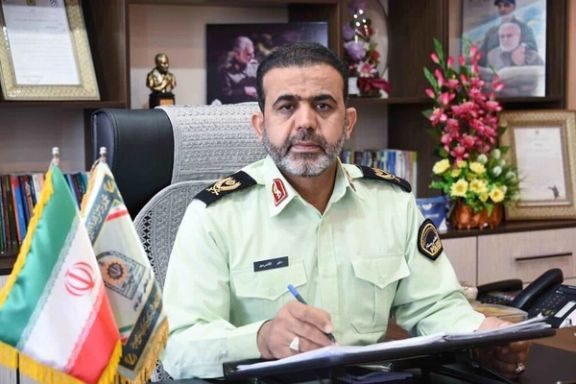
Following the encounter with hijab enforcers, Armita fell into a coma and is kept in a heavily guarded hospital. She reportedly hit her head when she fell to the ground and lost consciousness after being assaulted by hijab enforcers on her way to school in a subway car two weeks ago. Last week, Hengaw Human Rights Organization reported that her medical team has told the family there is no hope for her recovery.
The regime has consistently resorted to a playbook of distorting the truth and intimidating victims’ families whenever its agents are implicated in any significant crime. Similar to the way they handled the situation while Mahsa Amini was hospitalized comatose, authorities have significantly restricted the family's access to Armita. Both the journalist who wanted to cover Armita’s story and Armita’s mother were briefly detained. Two journalists that reported on the case of Mahsa Amini are still in prison in Tehran since her death more than a year ago. The regime also killed more than 500 people and arrested over 22,000 who protested her death during months of rallies and strikes.
The news of Armita being reported as braindead has stirred outrage among many Iranians, who witness more people falling victim to the regime's strict enforcement of hijab that has become increasingly severe by punitive regulations via new hijab laws and modern technology.
People on social media question why authorities can use surveillance cameras to identify women who defy hijab but seem unable to find the truth in such situations. Footage of Armita's presence at the subway station and an audio file of the call made by an employee of the Tehran Metro to the emergency services, which state media have released, have not been able to convince the public that hijab enforcers were not involved in the incident.
In a harshly worded letter addressed to Iran’s ruler Ali Khamenei, daughter of former Iranian president Hashemi Rafsanjani enumerated the names of some of the iconic victims of the regime, asking, “How many Nedas, Navids, Mahsas and Armitas must be sacrificed and how long this destruction must continue until you realize the severity of the situation?"
Female Islamic scholar Sedigheh Vasmaghi also released a video without hijab for the first time last week, saying, "We must not stay silent and witness every day that an Armita, a Mahsa or another beloved child of ours becomes a victim merely for not wearing a headscarf."
The anti-regime movement that began more than a year ago has made it increasingly difficult for the clerical regime to enforce the mandatory Islamic dress code. Since the beginning of the ‘Women, Life, Freedom’ movement, tens of thousands of girls and women have shed their compulsory hijab. The regime seeks to criminalize hijab defiance, but no branch of the government wants to be solely responsible for complications and the risk of social backlash.
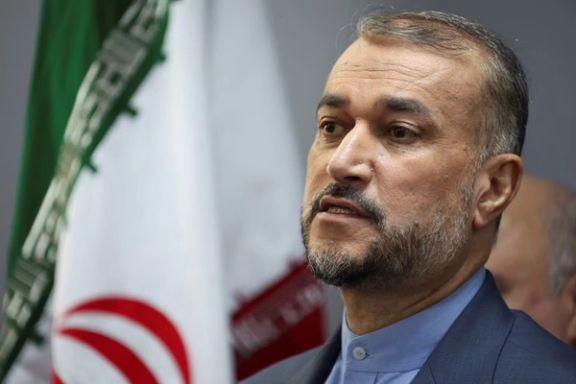
As tensions escalate in the Middle East, the Iranian Foreign Minister issued a warning about possible “preemptive measures” against Israel.
During a televised statement on Monday, Hossein Amir-Abdollahian expressed concern about the continuation of what the Iranian regime refers to as "war crimes of the Zionist regime", claiming if the bombardment of Gaza does not stop, "new fronts will be opened", referring to its proxies in Lebanon and Syria on Israel's borders.
It further raised concerns of Iran's fueling an already bloody war which since Hamas' October 7 invasion of Israel, has seen thousands killed across Israel and Gaza.
Shortly after his remarks, the Israel Defense Forces (IDF) launched airstrikes on Hezbollah positions in Lebanon. The IDF aimed to thwart an attempted penetration by Hezbollah forces into northern Israel. The IDF announced it had killed four terrorists on Tuesday morning.
The IDF stated that the targeted sites in Lebanon were used by Hezbollah to direct acts of terrorism. The strikes were in response to previous attacks by Hezbollah against the IDF. Former Hamas leader Khaled Meshaal also encouraged Hezbollah to become more directly involved in the ongoing conflict, emphasizing the importance of unified efforts in the battle.
At the same time, US President Joe Biden is scheduled to visit Israel and then proceed to Jordan on Wednesday, where he will engage with leaders from both Israel and the Arab world.
Biden's primary objective is to convey an unwavering commitment from the United States to support Israel. His administration has affirmed its dedication to providing military assistance, dispatching US carriers and aid to the region.
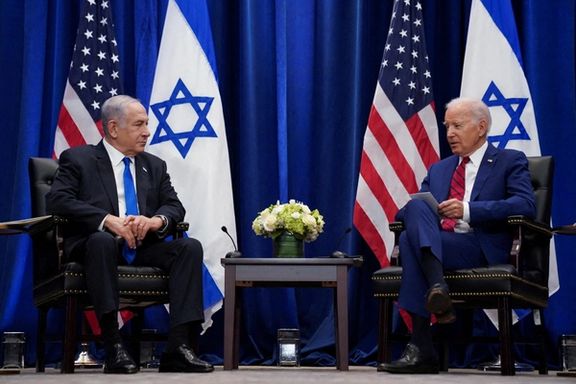
President Joe Biden will visit Israel on Wednesday, the White House has announced, as the commander of US forces in the Middle East arrived in Israel on Tuesday
The visit comes amid growing concerns that the conflict between Hamas and Israel would spread out and set the region ablaze.
Israeli forces have been preparing for a ground invasion of Gaza since last week, in retaliation for Hamas’ unprecedented attack that killed more than 1400 Israelis.
President Biden will also visit Jordan, where he will meet with King Abdullah, Egyptian President Abdel Fattah Sisi, and Palestinian Authority President Mahmoud Abbas. The leaders are expected to discuss the humanitarian situation in Gaza, where over 2,700 have been killed in Israeli airstrikes.
Secretary of State Antony Blinken said this morning that “the United States and Israel have agreed to develop a plan that will enable humanitarian aid from donor nations and multilateral organizations to reach civilians in Gaza.”
Blinken is on a marathon tour of the region. Monday, he had a 7-hour meeting with Israeli Prime Minister Netanyahu and his war cabinet.
President Biden's visit was announced only after Blinken received assurances that the Israeli government would agree to a comprehensive humanitarian aid package, including the establishment of safe zones for Palestinian civilians.
The US government seems to be pursuing a dual objective of aid and de-escalation, while supporting Israel in any decision it takes in its war against Hamas.
"We're not dictating terms or operational directions to the Israelis," said the Pentagon Press Secretary John Kirby on Monday. “We don't want to see escalation. We want to make sure humanitarian assistance begins to flow."
Hamas has taken numerous hostages into Gaza, including an undisclosed number of American citizens. Biden’s visit underscores the urgency of resolving this crisis.
US officials have expressed deep concern about the risk of this conflict escalating into a broader regional war. Biden has also issued warnings to other actors, particularly Iran, urging restraint and caution.
On Monday, Iranian Foreign Minister Kanaani issued a veiled threat to Israel. “They expose themselves to all sides that consider themselves committed to supporting the Palestinian people," he said, implying that its proxies on Israel's Lebanese and Syrian borders will once again be mobilized.
The Biden administration is keeping a watchful eye on the sentiments in Arab countries, where there is significant sympathy for the Palestinian cause. Escalation in the region could intensify pressure on these governments to take action against Israel, further complicating the situation.
Hezbollah began its most active day of attacks against Israel since the war began as tensions simmered and 28 towns and villages in Israel were subsequently evacuated.
On the other side, Israel’s attack on Gaza has displaced more than half a million Palestinians. The Israeli military says it won’t stop until Hamas is eliminated. It has called for over a million Palestinians to evacuate northern Gaza. UN officials have deemed this order unworkable and against international law.
The UN and the Biden administration have tried to draw a clear distinction between Hamas and Palestinian civilians, as Hamas has been urging residents not to leave northern Gaza. Many accuse the militant group of using civilians as human shields.
Egypt, a historical mediator in cease-fires between Israel and Palestine, plays a pivotal role in the ongoing efforts to secure humanitarian assistance. The Rafah crossing on the Egyptian border with Gaza is seen as the only lifeline for many Palestinians.
Secretary Blinken has tried to negotiate the opening of the Rafah crossing for the departure of foreigners and dual nationals. Following his meeting with President Sisi, Blinken announced that Rafah "will be opened".
The status of this agreement remains somewhat unclear.

The murder of a renowned film director and his wife in Iran has raised suspicions of parallels with the serial murders of intellectuals by intelligence agents in the late 1990s.
Dariush Mehrjui and Vahideh Mohammadifar were stabbed to death at their villa near Tehran Saturday. Bodies were discovered by their daughter, Mona Mehrjui, the same evening.
The revered eighty-three-year-old director refrained from engaging in politics for many years. However, over the past year, he subtly expressed support for the ongoing Woman, Life, Freedom anti-regime movement. This support is speculated to be a possible reason for him being targeted by the state, according to some allegations.
Mehrjoui had also condoled dissident soccer legends Ali Daei and Ali Karimi, and Elnaz Rekabi, a climber who was one the first to ditch her hijab in an international competition, in a handwritten letter he published on Instagram at the height of the protests last year for “the catastrophic massacre of innocent teenagers and youth”.
BBC’s Persian channel on Sunday also aired excerpts of an unfinished documentary about Mehrjui’s life by Hassan Solhjou, a filmmaker and a senior producer of BBC World Service, in which he was expressing his opposition to compulsory hijab by removing his wife’s headscarf. In another scene, he said he was tired of “four decades of deceit”, referring to the 44 years of Islamic rule in Iran.
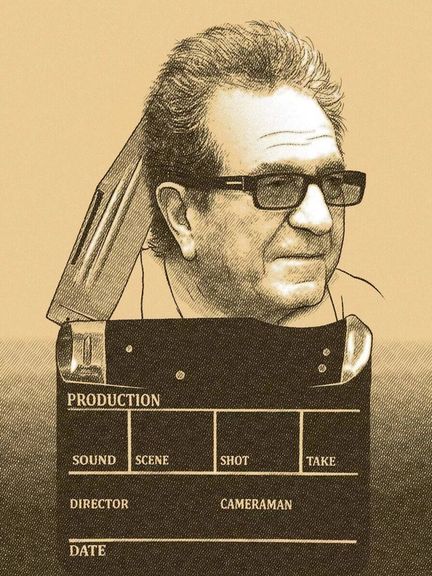
Iranian media, politicians and activists have extensively pointed out the similarity between the double murders and the killings of tens of dissident politicians, writers, activists, and even academics over a period of at least two years that came to be known as “chain murders” in the late 90s.
“The news of Dariush Mehrjui and his wife’s murders was an immediate reminder of the serial murders in the 1990s, particularly the murders of Dariush Forouhar and his wife [Parvaneh Eskandari], which bore dire consequences [for the country],” Jomhouri Eslami wrote Monday in an editorial entitled “Take The Karaj Murder Seriously”.
Forouhar, who was the leader of the pan-Iranist Nation Party of Iran, and his wife Parvaneh met a brutal end when they were repeatedly stabbed at their Tehran home in November 1998. These heinous killings triggered widespread national outrage and were promptly linked to dozens of other unsolved murders of intellectuals by both the public and the reformist media.
Supreme Leader Ali Khamenei and his supporters blamed “foreign enemies” including Israel for the murders of Forouhar and his wife but public demand for answers eventually led to the reformist government of President Mohammad Khatami to take action to find the culprits.
At Khatami's insistence, a three-member investigative team was formed, and it ultimately confirmed suspicions that the intelligence ministry was directly involved in the killings.
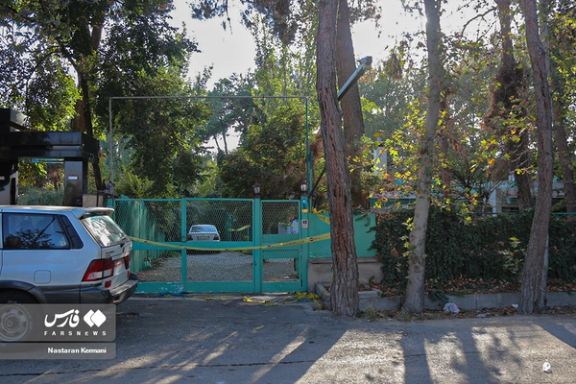
The ministry issued an unprecedented statement on January 4, 1999, which blamed “rogue” agents for four of the killings while calling the murders “despicable and abhorrent” and the minister, Ghorban-Ali Dorri-Najafabadi, favored by Khamenei who had still not consolidated his power as Supreme Leader, was replaced with the relatively moderate Ali Younesi.
The chain murders and the scope of the conspiracy are still shrouded in mystery. Intelligence agents arrested for the killing were tried behind closed doors by a military court and Saeed Emami, a deputy minister who allegedly masterminded the murders was said to have committed suicide in prison.
The Jomhouri Eslami newspaper, which serves as a mouthpiece for moderate traditionalist clerics and holds the distinction of being the Islamic Republic's oldest newspaper, called upon the authorities not to prematurely conclude their investigations, even if they discover that theft played a role in the incident.
“One should not ignore the possibility that theft could have been used as a cover for the real goal and a group planned and carried out the theft through several intermediaries as a cover up,” the newspaper warned.
Officials including President Ebrahim Raisi and Chief Justice Gholam-Hossein Mohseni-Ejei have ordered the case to be promptly investigated and a police spokesman has said that so far seven have been arrested on suspicion of involvement in the double murders.

Russia’s President Vladimir Putin, who has been isolated on world stage, entered the diplomatic fray of the Israel-Hamas war on Monday speaking with regional leaders.
Putin who spoke with Iran’s President Ebrahim Raisi and leading Arab powers in an attempt to secure a ceasefire in the war between Israel and Hamas.
Raisi was quoted as telling Putin that supporting the Palestinians is Iran's foreign policy priority, but the "resistance" groups make their own independent decisions, Iranian state media reported.
They quoted Raisi as also telling the Russian president: "There is a possibility of the conflict between Israel and Palestinians expanding to other fronts."
Iran’s clerical rulers, who have supported militant Arab groups for four decades with money, weapons and training, celebrated the Hamas attack on Israel and the killing of over 1,400 Israelis. The United States has warned Tehran not to get directly involved, as it has sent a powerful naval task force to the Eastern Mediterranean to deter Iran’s proxy the Hezbollah from opening a northern front against Israel.
Russia, which has relationships with Iran, Hamas, major Arab powers as well as with the Palestinians and with Israel, has repeatedly said the United States and the West have ignored the need for an independent Palestinian state within 1967 borders.
Russia’s relations with the West have significantly worsened after it invaded Ukraine last year trying to replace the government in Kyiv and annex large parts of the country.